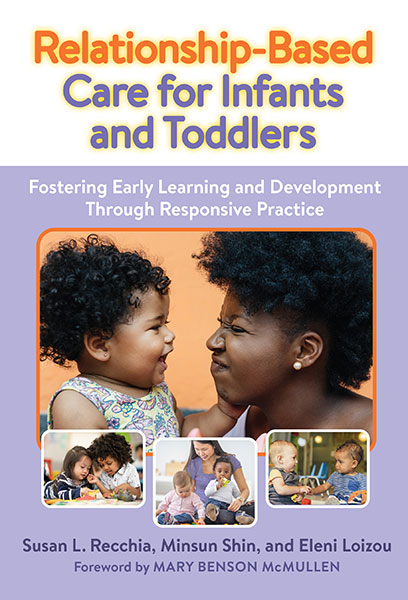Professors: Request an Exam Copy
Print copies available for US orders only. For orders outside the US, see our international distributors.
Susan L. Recchia, Minsun Shin, Eleni Loizou
Foreword by: Mary Benson McMullen
Publication Date: November 24, 2023
Pages: 144
Series: Early Childhood Education Series

Learn how to create and nurture communities of care for diverse children, families, and practitioners through responsive practice. In this text, the social and emotional worlds of babies and toddlers, their peers, and their caregivers come to life in the everyday moments of infant-toddler care and education. The authors show infants and toddlers as active, agentic, and intentional social partners from the start of life, highlighting their unique capacities for social engagement with both adults and peers. Interwoven within each chapter’s narrative are insights culled from extensive observations, teacher interviews, and video analyses. Part I emphasizes play, peer friendships, and humor as essential elements of infant learning, illustrated throughout with anecdotes of praxis in early care and education settings. Building on these aspects of babies’ ways of being in group care, Part II examines the complex roles of infant-toddler professionals and the critical importance of supportive and caring environments. Readers will explore the elements needed for in-depth and specialized professional preparation, including overarching principles of relationship-based practice.
Book Features:
Susan L. Recchia is a professor emeritus in the Department of Curriculum and Teaching at Teachers College, Columbia University. Minsun Shin is an associate professor in the Department of Teaching and Learning at Montclair State University. Eleni Loizou is a professor in the Department of Education and Early Childhood Education Program at the University of Cyprus.
“(The authors) masterfully interweave relevant theory and research with insightful personal stories and vignettes in this brilliant book… I was particularly fascinated by their descriptions of infant–toddler friendships and captivated by their accounts of infant humor, much of the research for which was compiled over recent years by the authors themselves. These topics and more, along with the authors’ highly readable writing style, make this book an ideal resource to share with families, community members, and policymakers about why we must prioritize relationship-based care.”
—From the Foreword by Mary Benson McMullen, professor of early childhood education in curriculum studies, Indiana University, Bloomington
“In this book, the authors give many ideas for providing the environmental characteristics most important for ‘relationship-based’ infant care and education, stressing that this involves ‘emotional labor’ by caregivers. Although they give good practical suggestions and ideas for promoting play, friendship, and humor development at this early age, their major focus is on ways to develop ‘professional love’ between caregivers and infants. This is a valuable perspective for promoting high-quality infant care.”
—Doris Bergen, University Distinguished Professor Emeritus, Miami University
“This book is a gift to early childhood teachers, to teacher supervisors and faculty for teacher training, to parents, and to the field of early childhood. The authors have integrated important theory, research, and experiences in classrooms to argue for a system of care based on positive and harmonious relationships within and between the participants in infant-toddler classrooms. I highly recommend it.”
—Carollee Howes, research professor of education, UCLA
“Recchia, Shin, and Loizou take us on a deep dive into key concepts and intimate experiences that make for high quality, responsive, relationship-based care for infants and toddlers. Filled with reflections based on close observations of children and their caregivers, this book is a must-read for anyone engaged in or preparing to teach in programs for our youngest children.”
—James Elicker, professor emeritus, Purdue University
Contents
Foreword Mary Benson McMullen ix
1. The Social and Emotional World of Infant–Toddler Childcare 1
Introduction 1
The Power of Relationships as a Context for Social and Emotional Learning 5
Overarching Principles That Guide Relationship-Based Practice 6
Overview With Brief Chapter Descriptions 7
Chapter Summary 9
Part I: Distinctive Infant–Toddler Social Encounters in Childcare
2. Infant–Toddler Play as an Essential Component of Early Learning and Development 13
Infants’ and Toddlers’ Ways of Learning 13
Infants’ and Toddlers’ Play Experiences 15
Infant–Toddler Play Practices and the Caregiver Role 22
Discussion Questions 29
3. Friendships Among Infant–Toddler Peers 30
Infant–Toddler Friendships 31
Friendship Experiences and Sociocultural Context 36
Infant–Toddler Caregiving to Support Friendships and Social Experiences 39
Discussion Questions 42
4. Creative Social Exchanges: Infant–Toddler Humor 43
Humor Definition and Theories 43
Peer Social Encounters as a Catalyst for Humor Development 50
Classroom Learning Environments and Caregiver Roles Support Humor 52
Discussion Questions 57
Part II: Creating Interpersonal Environments That Support Responsive Care
5. The Complex Role of Infant–Toddler Professionals: Care, Love, Diversity, and Identities 61
Bringing Care, Education, and Love Together 62
Contemplating Emotional Labor 66
Appreciating Diverse Lived Experiences 69
Discussion Questions 73
6. Becoming an Infant–Toddler Teacher: Ways of Thinking and Ways of Being 74
Relationship-Based Care and the Primary Care System 75
Being With and Learning From Infants and Toddlers 77
Becoming an Infant–Toddler Practitioner Within a Supportive Learning Community 82
Discussion Questions 90
7. Constellations of Care: Building Caring Infant–Toddler Communities 91
Constellations of Caring/Ethic of Care 92
Valuing Inclusive Practice/Honoring Differences 96
Respecting and Supporting New and Continuing Transitions 98
Capitalizing on Opportunities to Build Community Among Staff, Children, and Families 100
Making Administrative and Policy Decisions That Reflect Relationship-Based Practice 102
Discussion Questions 104
8. Enduring Reflections for the Field of Infant–Toddler Care and Education 105
Infants and Toddlers as Being and Becoming 105
Infants’ and Toddlers’ Rights to Responsive and Loving Care 107
Infant–Toddler Care as a “Home” for Fostering Community and Subjective Well-Being 109
Concluding Thoughts 110
References 111
Index 127
About the Authors 133
Professors: Request an Exam Copy
Print copies available for US orders only. For orders outside the US, see our international distributors.